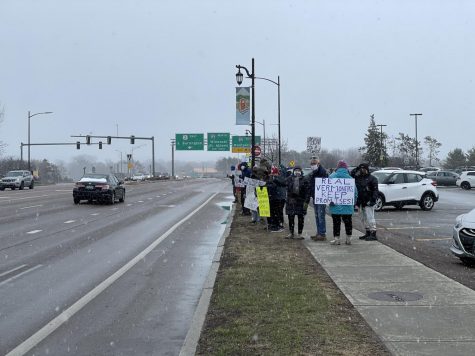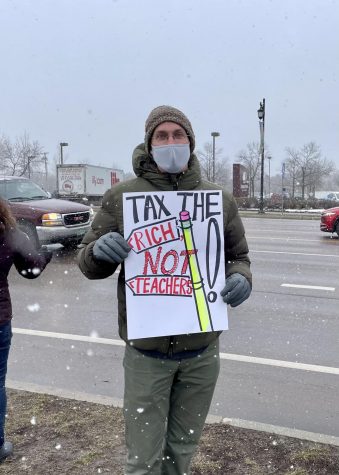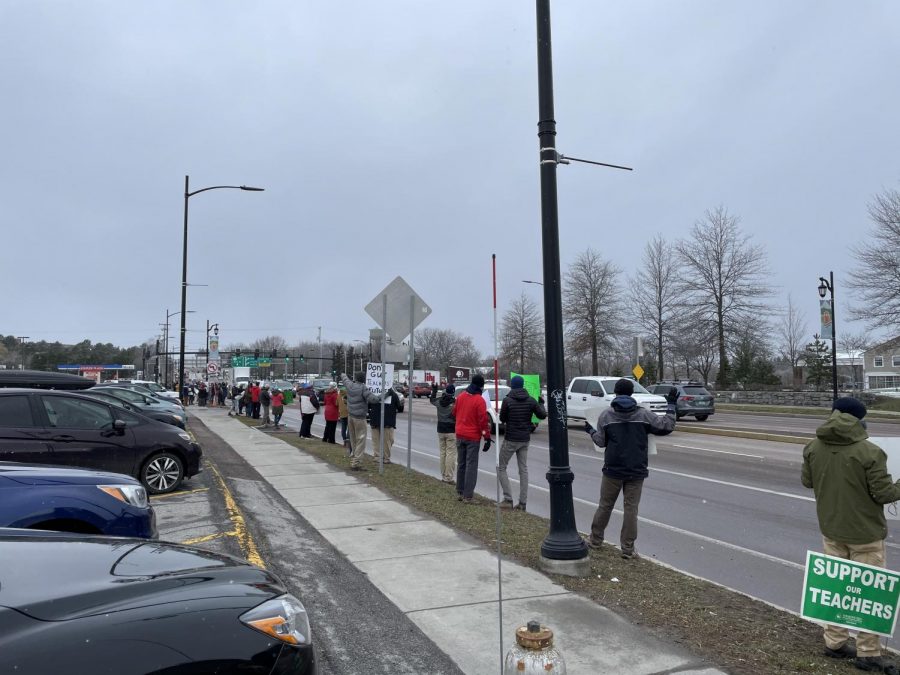Pension Plan Dropped After Statewide Teachers’ Protests
Teachers picket Williston Road on Thursday afternoon, April 1, in opposition to the proposed changes to the state pension system.
April 2, 2021
Dozens of teachers from schools in the Burlington area braved the wintry weather on Thursday afternoon, April 1, and lined Williston Road by Staples Plaza. Holding signs like, “A PENSION IS A PROMISE” and “ESSENTIAL WHEN CONVENIENT”, teachers picketed in opposition to a controversial proposal in the Vermont House to reshape the state pension system.
Similar protests against the proposal erupted around the state throughout the week, including in Middlebury, Saint Albans, and Rutland. The pressure seems to have worked.
On Friday morning, April 2, House Speaker Jill Krowinski, D-Burlington, announced that she has dropped the proposal. Instead, she is establishing a task force to address the state’s increasing pension debt, which will include labor union representatives and members of the Scott administration.
Erin Bahrenburg and Kathy Murphy, both teachers from the South Burlington School District, came to the protest after four hours of parent-teacher conferences on Zoom. Bahrenburg called on legislators to find “a better way to reach an agreement about our pensions, which are now really under fire and trying to be gutted by legislators.”
“I have worked hard as a teacher, come in every day even during the pandemic, and I’ve paid into my pension and planned on it,” Murphy said. “It’s really important that the state honors their commitment to us.”
The problem: The proposed overhaul of the pension system was an effort to reduce the over $3 billion gap between how much money the state’s pension funds are taking in and how much they will have to pay out over time, known as the unfunded liability. The substantial unfunded liability is a result of poor investment returns—Vermont’s pension funds have had an average annual return of 7.2%, barely more than half of the S&P 500’s average annual return of 13.6%—and chronic underfunding between 1989 and 2007 to free up cash for other spending.

Keith Brown, a Flynn Elementary School teacher, called on state legislators to find a way to address the growing unfunded liability without placing so much of the burden on teachers.
“It has to be something that’s done on the state level in terms of fixing the whole thing, finding savings, having teachers pay some more, and adjust some things,” Brown said. “But also [legislators] have to fix it—really fix it—and not just say, ‘We’re gonna reform this thing by screwing over teachers and putting it totally on their backs.’”
The proposal would have increased the percentage of salary teachers contribute from either 5%-6% to 7.25% and limited cost-of-living increases for future retirees to only the first $24,000 of income until the performance of the fund improves. It also included a provision that doubled the required amount of time teachers and state employees would have to work for the state before they could become vested in a pension, from five years to 10 years.
Perhaps the most controversial element of the proposal was raising the age to receive full benefits to 67.
BHS English teacher Andrew LeValley directed traffic in a reflective jacket at the picket at Staples Plaza to ensure both the safety and the visibility of the picketers. LeValley, like many other teachers, was worried that the proposal would prolong his time in the workforce.
“I want to stay in Vermont, and I can’t stay in Vermont if I have to work until I’m 70 years old,” LeValley said. “It’s undignified, and I want to retire with dignity.”
Many teachers were shocked to have their security attacked during what has already been a brutal year.
“It’s a really unfair proposal to do to teachers during this situation,” Joni Pecor, a Flynn elementary school teacher said.
Burlington City Council President Max Tracy joined the picketers at Staples Plaza in solidarity with teachers’ opposition to the proposed pension changes, holding a sign that said “TAX THE RICH, NOT TEACHERS!”
“We’ve seen teachers make so many sacrifices for our community to keep schools open, to keep our kids learning,” Tracy said. “To have the state legislature now put forward a proposal that would have folks who have sacrificed so much now have to pay more in and work longer is incredibly offensive.”

Tracy, like many other picketers, is calling on the state to shift the burden of reducing the unfunded liability to the wealthiest Vermonters.
“We need to be looking to those who really have a lot of money to pay in more to solve this problem, not putting it on the backs of the teachers who have made so many sacrifices and who, quite frankly, are exhausted in this moment,” Tracy said.
Heather McGrath, an Integrated Arts Academy teacher at the protest, supports implementing a surtax on wealthy Vermonters to fix the fund’s performance, or at least “something a little more creative than putting this stuff on teachers.”
“We’ve paid our fair share,” McGrath said. “It was an agreement that was made. It’s part of our contract. We want to see a fair deal.”
House Progressives proposed an amendment to the pension overhaul plan last week that would have added a 3% surtax to any Vermonter’s income over $500,000, which would apply to approximately the top 1.45% of earners in the state. The Legislature’s Joint Fiscal Office estimated that it could raise $40 million to $50 million a year. The amendment failed 125-21, with all Republicans and most Democrats opposed.
At the press conference Friday morning, Speaker Krowinski said legislators still intend to reform the pension system this year, and the task force will look at different sources of funding to address the unfunded liability.







Karl Sklar • Apr 2, 2021 at 9:35 pm
Good job A. Thanks.
The obvious dilemma: “the rich” quickly, easily. become Floridians thus escaping the surtax. It’s called the 6 months and a day law, I believe. No easy answers to this one.